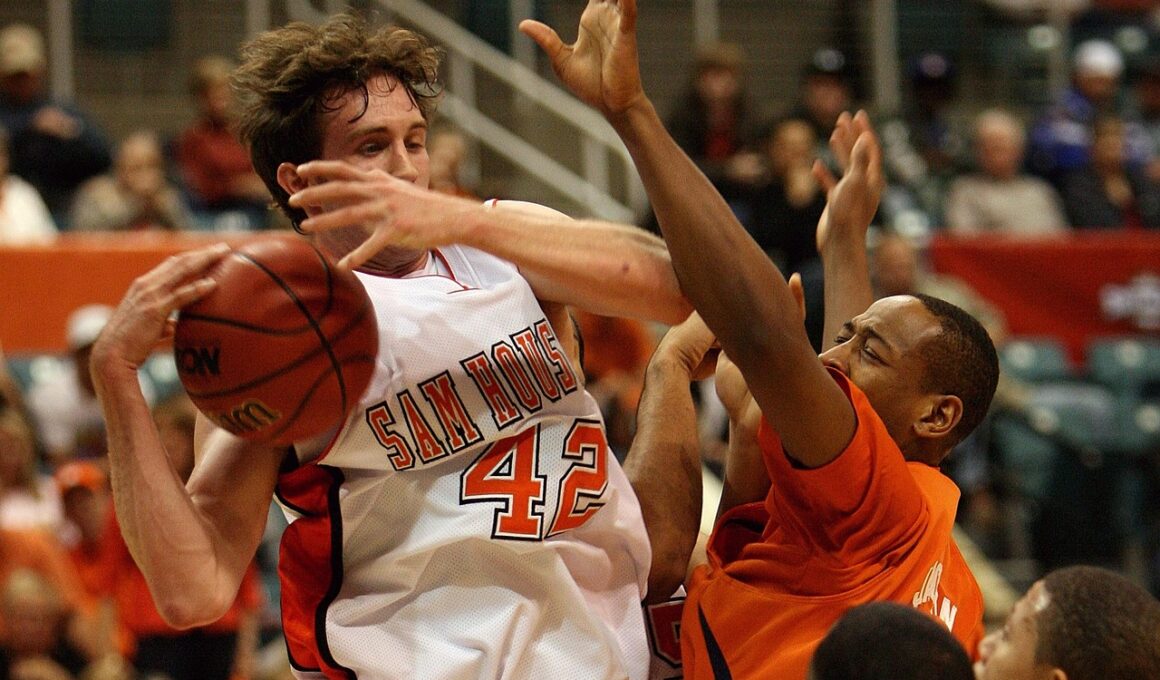The Psychology Behind Defensive Intensity in Basketball
In basketball, defensive intensity is crucial for a team’s overall success. It stems from a player’s mental approach to their role on the court. Intense defenses are often fueled by an understanding of game strategy combined with personal motivations. Players need to embrace their responsibility while feeding off the energy of teammates. This energy can change the momentum of a game and instill confidence in one another. Additionally, players often see that strong defensive plays lead to fast breaks, enabling their team to score easier points on the offensive end. When players understand how their defensive efforts produce positive outcomes, they become more willing to engage actively and pressure their opponents. Coaches often emphasize the importance of defensive focus, as it builds chemistry and trust within a team. The mental aspect of defensive intensity cannot be ignored; players must visualize and anticipate the movements of their opponents. Mental rehearsal can enhance a player’s performance, allowing them to react instinctively. Furthermore, a sustained defensive mindset can crush an opponent’s spirit, leading to mistakes. Thus, cultivating this psychological edge is pivotal for any competitive basketball team.
Developing a strong defensive mentality requires a blend of confidence and preparation. Players who engage regularly in drills that simulate game scenarios tend to become more aware, learning to read their opponent’s tendencies. Coaches play a significant role in fostering this confidence through targeted training and feedback. They create an environment where players feel safe to make mistakes while learning to hone their skills. Celebrating defensive achievements, such as successful steals or blocks, reinforces a player’s desire to improve their intensity. Additionally, teamwork on defense is crucial; players need to communicate effectively and work in unison to stymie their opponents. Strong defensive communication involves signaling each other about screens, switches, and player movements. When a team operates seamlessly on defense, it builds an unbreakable bond, fostering a sense of togetherness. This chemistry not only improves performance but also increases enjoyment in playing. Furthermore, players often experience a heightened sense of satisfaction when they see their hard work translate into tangible results. Each successful defensive play boosts morale, reinforcing the idea that an intense, focused defense can create opportunities for offensive scoring, enhancing a team’s overall performance.
Understanding Motivation and Intensity
Understanding what motivates a player can impact their defensive intensity significantly. Players driven by intrinsic motivation—those who play for their love of the game—often display higher levels of intensity. Conversely, players motivated extrinsically—by rewards or recognition—may falter if those incentives fade. Thus, coaches need to identify these motivators, tailoring their approach accordingly to unlock each player’s fullest potential. Moreover, seeing defensive intensity as a source of pride plays a vital role in basketball. Players who depend on their defensive skills know that their contributions do not go unnoticed. Recognizing standout performances builds self-esteem and encourages consistency. To further amplify motivation, coaches might implement team challenges focusing on defensive goals, such as accumulating steals or defensive rebounds. These challenges promote friendly competition and foster camaraderie among teammates. By channeling their energy into these objectives, players learn to take pride in defensive achievements. Also, emphasizing personal progress can help players realize their potential rather than focusing solely on results. Adding competitive elements can further elevate both motivation and intensity, ensuring players stay engaged during practices and games.
A keen understanding of game psychology can enhance player intensity. For instance, awareness of how an opponent’s behavior reflects their state can allow players to adapt their strategy effectively. This adaptability is key when engaging in high-pressure situations or determining the most opportune moment to apply defensive pressure. Players who recognize the subtle signs often outperform their peers due to their heightened situational awareness. Additionally, employing psychological techniques such as visualization allows players to mentally rehearse scenarios. Imagine already being in a fierce competition helps players feel prepared and confident when facing real-game challenges. Coaches can encourage this practice as part of their training regimen, reinforcing its benefits every time they discuss game plans. Building resilience also contributes to a player’s defensive mindset. Facing various challenges during games fosters growth and adaptability. A resilient player learns to push through fatigue and remain focused, allowing for greater effort defensively. As a result, they maintain their defensive intensity even in the face of adversity. Understanding these psychological aspects gives teams a strategic edge and contributes to the player’s development into an effective defender.
Team Defense: Collective Efforts
Defensive intensity is not just an individual effort; it requires a collective commitment from the entire team. A cohesive defensive strategy relies on each player’s ability to understand their role within the larger framework. Players must synergize their movements, ensuring they’re always aware of their teammates’ positioning. This unity can create a formidable barrier that is hard for opponents to penetrate. Communication is essential in creating this effective team defense. When players call out screens, switches, or provide encouragement, they cultivate an environment where intense defense thrives. Moreover, drills designed for team-building can sow the seeds of effective cooperation. Sessions focusing on defensive rotations can improve fluidity between positions, making it easier to adjust to unexpected plays by the opposition. Players must also pay attention to their defensive spacing; maintaining appropriate distance can help enforce physicality without drawing fouls. As players grow in their understanding of supports and rotations, their defensive capabilities become more instinctive. Therefore, creating a unified team dynamic centered on defense enhances players’ resolve and speeds up development, leading to greater overall success.
Insight into the psychological elements behind defensive intensity can also unlock pathways to player improvement. Coaches must encourage a growth mindset, emphasizing the importance of learning from experiences rather than merely focusing on outcomes. Acknowledging that defensive plays can be improved through practice can create a more engaging experience. Players who know that their effort contributes to overall team performance often exert greater intensity during games. Training sessions must include reflections on both successful and unsuccessful defensive plays to identify areas for development. Each failure should be viewed as an opportunity rather than a setback. In turn, this promotes resilience and a sense of ownership over their performance. Recognizing progress over time fosters deeper commitment to improve and engage in defensive training. Creating specific goals centered around improving defensive intensity, such as reducing fouls or increasing steals, will provide structure for measured progress. As players attain mini-goals, their confidence grows, which reinforces their commitment to intense defensive plays. Coaches who adapt individual goals to fit each player’s specific needs demonstrate their investment in their personal growth, aiding in cultivating both intensity and passion.
Conclusion: The Path Forward
In conclusion, fostering defensive intensity in basketball relies heavily on the psychological and collective aspects of team performance. Coaches play a pivotal role in building an environment where players feel confident in their abilities. They must introduce training drills geared toward boosting motivation and creating camaraderie among team members. Players can benefit significantly when they approach defensive intensity with the mindset of learning and growing rather than focusing only on winning games. This shift enables them to engage more deeply in developing their skills and honing their instincts for the game. Effective communication within the team enhances trust and connection, leading to elevated performance. As players adopt this comprehensive approach to defense, they learn that intensity can indeed be infectious. A single player’s fervor can ripple through the entire squad, establishing a formidable defensive presence on the court. Additionally, nurturing relationships through practice fosters bonds outside the game, encouraging a sense of accountability. Ultimately, making defensive intensity a core aspect of basketball training contributes not only to a player’s skills but also to the overall success of the team—an outcome everyone strives for.
To summarize, understanding the psychology behind defensive intensity will empower teams to refine their performance. It paves the way for future successes within the sport of basketball. Each player must embrace the responsibility of defense as a key component of their role. With consistent effort and commitment from both coaches and players, it is possible to cultivate relentless defensive intensity. Engaging mental practices, building team communication, and reinforcing goal-setting can lead to remarkable improvements. The psychological underpinnings of performance are significant—recognizing that holds key to unlocking potential for greatness. In that regard, teams should prioritize their efforts to refine strategies at every level to embrace these important components. The future of basketball will likely see evolved dynamics of play where the mental approach becomes more critical than ever. As teams capitalize on defense through mental acuity, their overall game will benefit significantly. The trend towards a more robust and psychology-focused training will pave the way for future basketball stars. By integrating these psychological principles strategically into training and game performance, players and teams will enhance their potential for victory, fostering a legacy that will carry forward.


